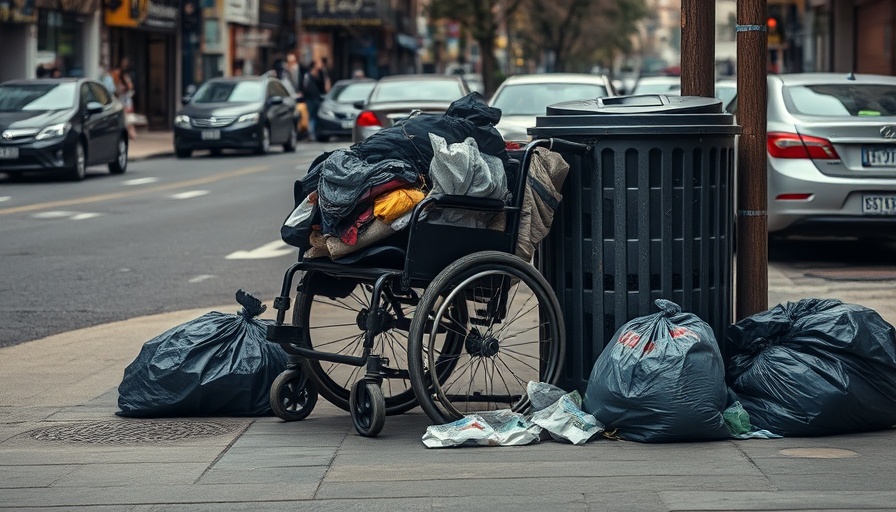
San Francisco's Tenderloin Faces Trash Crisis After Bin Funding Cut
The Tenderloin Community Benefit District (CBD), known for its bold initiatives to clean up the streets, finds itself in a precarious situation following the loss of funding for its solar-powered trash bins. Initially, this effort was part of a plan to tackle littering and maintain the cleanliness of the neighborhood—a region often overshadowed by issues related to poverty and homelessness.
What Went Wrong? Exploring the Funding Dilemma
Back in 2020, the CBD opted to remove traditional city trash cans, which were frequently rifled through, leaving litter strewn across sidewalks. As a solution, they installed 76 Bigbelly solar-powered trash cans, designed to be tamper-resistant and efficient. Funded by a grant from the city’s Office of Economic and Workforce Development (OEWD), these bins were expected to enhance cleanliness in the area.
However, as the city grappled with scandal and inefficiency, the promised custom-designed trash cans from the Department of Public Works (DPW) took longer to materialize, ultimately leading to the loss of the grant in June. This unexpected development left the Tenderloin CBD scrambling for solutions while also facing a hefty contract termination fee of over $150,000.
A Call for City Responsibility
Kate Robinson, the current president of the Tenderloin CBD, expresses her concern over the lack of coordination between local organizations and the city government. “I don’t want there to even be a week where there are no trash cans,” she stated, highlighting the urgency of addressing this issue. Some community members believe the city has a responsibility to provide adequate trash services, a sentiment echoed by Simon Bertrang, the former CBD head.
“The city should have a responsibility to deliver adequate trash can service,” Bertrang remarked, pointing out the necessity of collective action in ensuring basic city services are met effectively.
Trash Management and Public Safety: The Bigger Picture
The loss of efficient trash receptacles poses not only aesthetic concerns but also questions surrounding public safety. San Francisco has seen the consequences of inadequate waste management, reflected not just in litter but also in the public health implications stemming from the accumulation of trash. In neighborhoods where public encampments have proliferated, the challenge of maintaining cleanliness can affect community dynamics and perceptions of safety.
The temporary absence of reliable trash cans could exacerbate these issues, pushing residents and business owners to raise alarms about the city’s commitment to maintaining public spaces. As trash accumulates, the risks increase, particularly in a city that's still recovering from the social and economic impacts of the pandemic.
Possible Solutions and Keeping the Community Engaged
The current crisis in the Tenderloin serves as a wake-up call for urban planners and local government. Engaging with community members to explore sustainable solutions could lead to creative approaches in ongoing efforts to bolster public safety and aesthetics in this historic neighborhood. Collaboration could take many forms—from engaging local businesses in supporting trash management initiatives to workshops aiming to brainstorm sustainable practices.
Maintaining open lines of communication with Tenderloin residents can empower citizens to advocate for better service delivery. Regular community meetings can ensure that local concerns are heard and addressed while promoting transparency and accountability from city officials.
Future Predictions: Is the City Ready to Innovate?
The Tenderloin’s plight is reflective of broader systemic issues in urban waste management. As cities continue to face mounting challenges related to population density and public health, the emphasis on innovative waste solutions becomes paramount. The future hinges on how effectively urban areas like San Francisco can employ technology and community engagement to tackle pressing issues of sustainability and hygiene.
As solutions evolve, citizens should stay informed and actively participate in discussions about local initiatives that seek to redefine community maintenance standards.
Encouragement for Civic Participation
The unfolding events in San Francisco’s Tenderloin neighborhood exemplify the interconnectedness of community involvement and effective local governance. Citizens are encouraged to stay engaged with ongoing deliberations, attend community meetings, and advocate for solutions that align with their needs. Remember, your voice matters, and community-driven solutions pave the way for a cleaner future.
For those interested in contributing to improved waste management efforts in San Francisco, visiting local forums or reaching out to neighborhood organizations is a productive way to make an impact.
 Add Row
Add Row  Add
Add 




Write A Comment